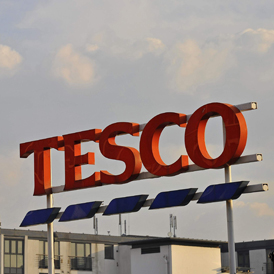Tesco ‘disappointed’ by its Christmas trading
It’s the UK’s biggest supermarket chain – but £4bn has been wiped of Tesco’s market value, after it reported “dire” Christmas sales. So what’s gone wrong? Sarah Smith takes a look.
The giant retail chain already has almost a third of Britain’s market share – but it’s just revealed a ‘disappointing’ 2.3 per cent in like for like sales over the festive period, enough to send its share price slumping by 15 per cent.
Tesco started a price war with its £500m price-cutting campaign at the end of September, but said the number of customers drawn in by its latest promotion had not been enough to offset the lower prices.
Chief executive Philip Clarke, who took over from Terry Leahy in March, admitted the company’s £500m Big Price Drop strategy hadn’t worked.
“I’ve got to acknowledge that we backed off on some of our promotion and coupon activity just as everyone upped it,” he said.
It’s not just problems with clothing and homeware, areas where cash-strapped shoppers were expected to cut back. Underlying sales were also down far more than expected.
We backed off our promotion and coupon activity just as everyone else upped it. Philip Clarke, Tesco CEO
Part of the problem, at least, has been Tesco’s pricing strategy, and the decision to cut back on Club Card rewards in favour of the Big Price Drop campaign.
But Ian Quinn, from The Grocer, told Channel 4 News that Philip Clarke revealed far more fundamental problems in stores. While he claimed to be “pleased” with pricing decisions, he was frank about areas like quality of service, and the range and quality of products on the shelves. Mr Quinn said Clarke wouldn’t go into detail, but promised improvements worth hundreds of millions of pounds over the next 12 months, aimed at a rapid turnaround in fortunes.

Squeezed Middle
For it’s that well-worn phrase, the “squeezed middle”, which is dogging Tesco’s performance. At the top end of the supermarket sector, Waitrose has reported booming business, breaking through the £200m a week sales barrier for the first time. Evidence, perhaps, that families fed up with a frugal Christmas decided to splash out on some Heston mince pies or a free range Bronze turkey. Sales of edible gold dust at Waitrose rose 113 per cent, year on year.
And at the discount end, brands like Aldi and Lidl saw their market share rise 0.2 per cent and 0.4 per cent respectively in December, as shoppers become more discerning about where they choose to spend. As Jon Copestoke from the Economist Intelligence Unit told the Wall Street Journal: “Larger retailers face growing frugality as fears over employment and the economy grow.”
Fundamental changes
Tesco is now under pressure to make tangible changes. Ian Quinn says they are already resigned to writing off the next 12 months as a period of slow growth, and have accepted the need to sacrifice some of their profits to make the fundamental changes they think are needed. New store openings will be curtailed, with no plans for any more super-sized Tesco Extras: instead there’ll be more investment in the one area still ripe for growth, online sales. Every little helps, after all.




